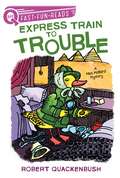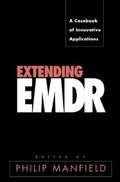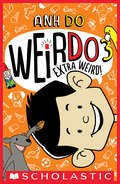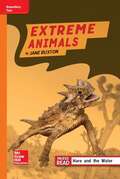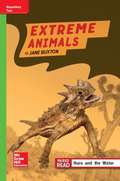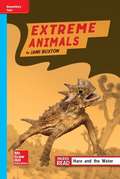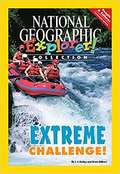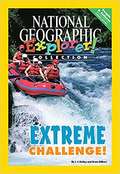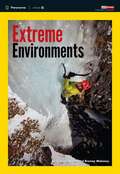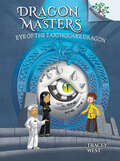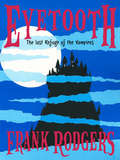- Table View
- List View
Expository Reading and Writing Course: Student Reader
by California State UniversityA task force of high school and CSU faculty has developed the Expository Reading and Writing Course (ERWC), a full-year college preparatory English course for high school juniors or seniors. The ERWC aligns with the California English-Language Arts Content Standards, addresses critical reading and writing problems identified by the CSU English Placement Test Committee, and prepares students to meet the expectations of college and university faculty.
Express Train to Trouble: A Miss Mallard Mystery (QUIX)
by Robert QuackenbushWorld-famous duck-tective Miss Mallard works to solve the case of a missing prankster in this engaging Aladdin QUIX mystery.Miss Mallard sets out to explain the disappearance of George Buddy Duck, a prankster who has aggravated all of the passengers on a train. Will she find him before he has the chance to cause more mayhem?
Extending EMDR: A Casebook of Innovative Applications
by Philip MansfieldPicking up where eye movement desensitization and reprocessing (EMDR) training leaves off, this book shows how EMDR can be used by therapists with different orientations, such as psychodynamic, Jungian and cognitive. Their patients have various diagnoses, including major depression, attachment disorder, post-traumatic stress disorder and various personality disorders; all are helped by the incorporation of EMDR into their treatment, as demonstrated by the case studies.
Extra Class License Manual: for HAM Radio
by American Radio Relay LeagueDetailed explanations for all questions, including FCC rules The ARRL Extra Class License Manual is your ticket to every privilege granted to Amateur Radio Operators. Our expert instruction will lead you through all of the knowledge you need to pass the exam: rules, specific operating skills and more advanced electronics theory. As an Extra Class licensee, you will have full privileges on all frequencies authorized by the FCC for Amateur Radio. To upgrade to Extra Class you must already hold a General Class license (or have recently passed all of the exams required for a General Class license). Upgrading to an Extra license only requires passing a written examination.
Extra Weird! (WeirDo #3)
by Anh DoFrom bestselling author Anh Do comes the hilarious hit chapter book series, WeirDo. These illustrated books will keep readers laughing as Weir and his friends navigate the trials of elementary school.Weir's back and extra weird!Dad's working on his cool dance moves for the local talent search, while Weir's trying out for the school soccer team! Will Weir score a goal, or fall flat?It won't be easy . . . but it will be funny!
Extreme Challenge!, Pathfinder Edition (National Geographic Explorer Collection)
by Greta Gilbert J. J. KelleyNIMAC-sourced textbook
Extreme Challenge!, Pioneer Edition (National Geographic Explorer Collection)
by Greta Gilbert J. J. KelleyNIMAC-sourced textbook
Eye Doctor on Call (Fountas & Pinnell Classroom, Guided Reading Grade 6)
by Devra SperegenNIMAC-sourced textbook
Eye of the Earthquake Dragon: A Branches Book (Dragon Masters #13)
by Tracey WestTime is running out for the Dragon Masters to stop the dark wizard Maldred!Pick a book. Grow a Reader!This series is part of Scholastic's early chapter book line, Branches, aimed at newly independent readers. With easy-to-read text, high-interest content, fast-paced plots, and illustrations on every page, these books will boost reading confidence and stamina. Branches books help readers grow!Dark wizard Maldred has stolen the Gold and Silver Keys! With these keys, he can now control the Naga: a powerful dragon who can cause terrible earthquakes. The Naga lives in a secret temple in the center of the earth... and Maldred is on his way there! Drake and his friends Jean and Darma travel to the temple to try to stop him. What will they find there? Will the Dragon Masters defeat Maldred once and for all?
Eyetooth - The last refuge of the vampires
by Frank RodgersEvil Count Fibula wants to return to the bad old days when vampires roamed the world. Count Muesli, young, popular and vegetarian, doesn't fit in with Fibula's dark plans so he's thrown out of Eyetooth - the secret last refuge of the vampires. But when his new human friends - Joe and his family - are captured by Fibula, Muesli knows he must return...
Eyewitness to Martin Luther King's "I Have a Dream" Speech (Standards Close-up Series)
by Susan BuckleyNIMAC-sourced textbook On August 28, 1963, Dr. Martin Luther King Jr. made one of the most famous speeches in United States history. Read descriptions about the historic March on Washington and the famous speech about civil rights. Compare reports in a newspaper to comments about the event from people who were there.

